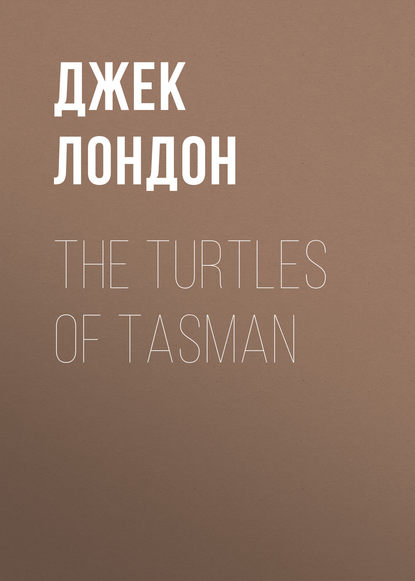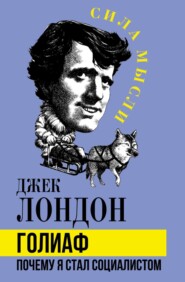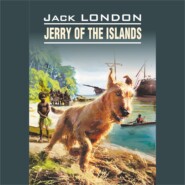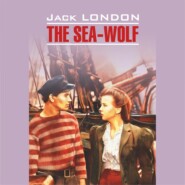По всем вопросам обращайтесь на: info@litportal.ru
(©) 2003-2025.
✖
The Turtles of Tasman
Настройки чтения
Размер шрифта
Высота строк
Поля
"I did the chopping before the scurvy got bad," he said. "Then I got a moose right at the start. I've been living high all right. It's the scurvy that's run me down."
He filled the glass, and added, "But the spruce tea's knocking it, I think."
"Have another," the barkeeper said.
The action of the two glasses of whisky on Morganson's empty stomach and weak condition was rapid. The next he knew he was sitting by the stove on a box, and it seemed as though ages had passed. A tall, broad-shouldered, black-whiskered man was paying for drinks. Morganson's swimming eyes saw him drawing a greenback from a fat roll, and Morganson's swimming eyes cleared on the instant. They were hundred-dollar bills. It was life! His life! He felt an almost irresistible impulse to snatch the money and dash madly out into the night.
The black-whiskered man and one of his companions arose.
"Come on, Oleson," the former said to the third one of the party, a fair-haired, ruddy-faced giant.
Oleson came to his feet, yawning and stretching.
"What are you going to bed so soon for?" the barkeeper asked plaintively. "It's early yet."
"Got to make Selkirk to-morrow," said he of the black whiskers.
"On Christmas Day!" the barkeeper cried.
"The better the day the better the deed," the other laughed.
As the three men passed out of the door it came dimly to Morganson that it was Christmas Eve. That was the date. That was what he had come to Minto for. But it was overshadowed now by the three men themselves, and the fat roll of hundred-dollar bills.
The door slammed.
"That's Jack Thompson," the barkeeper said. "Made two millions on Bonanza and Sulphur, and got more coming. I'm going to bed. Have another drink first."
Morganson hesitated.
"A Christmas drink," the other urged. "It's all right. I'll get it back when you sell your wood."
Morganson mastered his drunkenness long enough to swallow the whisky, say good night, and get out on the trail. It was moonlight, and he hobbled along through the bright, silvery quiet, with a vision of life before him that took the form of a roll of hundred-dollar bills.
He awoke. It was dark, and he was in his blankets. He had gone to bed in his moccasins and mittens, with the flaps of his cap pulled down over his ears. He got up as quickly as his crippled condition would permit, and built the fire and boiled some water. As he put the spruce-twigs into the teapot he noted the first glimmer of the pale morning light. He caught up his rifle and hobbled in a panic out to the bank. As he crouched and waited, it came to him that he had forgotten to drink his spruce tea. The only other thought in his mind was the possibility of John Thompson changing his mind and not travelling Christmas Day.
Dawn broke and merged into day. It was cold and clear. Sixty below zero was Morganson's estimate of the frost. Not a breath stirred the chill Arctic quiet. He sat up suddenly, his muscular tensity increasing the hurt of the scurvy. He had heard the far sound of a man's voice and the faint whining of dogs. He began beating his hands back and forth against his sides. It was a serious matter to bare the trigger hand to sixty degrees below zero, and against that time he needed to develop all the warmth of which his flesh was capable.
They came into view around the outjutting clump of trees. To the fore was the third man whose name he had not learnt. Then came eight dogs drawing the sled. At the front of the sled, guiding it by the gee-pole, walked John Thompson. The rear was brought up by Oleson, the Swede. He was certainly a fine man, Morganson thought, as he looked at the bulk of him in his squirrel-skin parka. The men and dogs were silhouetted sharply against the white of the landscape. They had the seeming of two dimension, cardboard figures that worked mechanically.
Morganson rested his cocked rifle in the notch in the tree. He became abruptly aware that his fingers were cold, and discovered that his right hand was bare. He did not know that he had taken off the mitten. He slipped it on again hastily. The men and dogs drew closer, and he could see their breaths spouting into visibility in the cold air. When the first man was fifty yards away, Morganson slipped the mitten from his right hand. He placed the first finger on the trigger and aimed low. When he fired the first man whirled half around and went down on the trail.
In the instant of surprise, Morganson pulled the trigger on John Thompson – too low, for the latter staggered and sat down suddenly on the sled. Morganson raised his aim and fired again. John Thompson sank down backward along the top of the loaded sled.
Morganson turned his attention to Oleson. At the same time that he noted the latter running away towards Minto he noted that the dogs, coming to where the first man's body blocked the trail, had halted. Morganson fired at the fleeing man and missed, and Oleson swerved. He continued to swerve back and forth, while Morganson fired twice in rapid succession and missed both shots. Morganson stopped himself just as he was pulling the trigger again. He had fired six shots. Only one more cartridge remained, and it was in the chamber. It was imperative that he should not miss his last shot.
He held his fire and desperately studied Oleson's flight. The giant was grotesquely curving and twisting and running at top speed along the trail, the tail of his parka flapping smartly behind. Morganson trained his rifle on the man and with a swaying action followed his erratic flight. Morganson's finger was getting numb. He could scarcely feel the trigger. "God help me," he breathed a prayer aloud, and pulled the trigger. The running man pitched forward on his face, rebounded from the hard trail, and slid along, rolling over and over. He threshed for a moment with his arms and then lay quiet.
Morganson dropped his rifle (worthless now that the last cartridge was gone) and slid down the bank through the soft snow. Now that he had sprung the trap, concealment of his lurking-place was no longer necessary. He hobbled along the trail to the sled, his fingers making involuntary gripping and clutching movements inside the mittens.
The snarling of the dogs halted him. The leader, a heavy dog, half Newfoundland and half Hudson Bay, stood over the body of the man that lay on the trail, and menaced Morganson with bristling hair and bared fangs. The other seven dogs of the team were likewise bristling and snarling. Morganson approached tentatively, and the team surged towards him. He stopped again and talked to the animals, threatening and cajoling by turns. He noticed the face of the man under the leader's feet, and was surprised at how quickly it had turned white with the ebb of life and the entrance of the frost. John Thompson lay back along the top of the loaded sled, his head sunk in a space between two sacks and his chin tilted upwards, so that all Morganson could see was the black beard pointing skyward.
Finding it impossible to face the dogs Morganson stepped off the trail into the deep snow and floundered in a wide circle to the rear of the sled. Under the initiative of the leader, the team swung around in its tangled harness. Because of his crippled condition, Morganson could move only slowly. He saw the animals circling around on him and tried to retreat. He almost made it, but the big leader, with a savage lunge, sank its teeth into the calf of his leg. The flesh was slashed and torn, but Morganson managed to drag himself clear.
He cursed the brutes fiercely, but could not cow them. They replied with neck-bristling and snarling, and with quick lunges against their breastbands. He remembered Oleson, and turned his back upon them and went along the trail. He scarcely took notice of his lacerated leg. It was bleeding freely; the main artery had been torn, but he did not know it.
Especially remarkable to Morganson was the extreme pallor of the Swede, who the preceding night had been so ruddy-faced. Now his face was like white marble. What with his fair hair and lashes he looked like a carved statue rather than something that had been a man a few minutes before. Morganson pulled off his mittens and searched the body. There was no money-belt around the waist next to the skin, nor did he find a gold-sack. In a breast pocket he lit on a small wallet. With fingers that swiftly went numb with the frost, he hurried through the contents of the wallet. There were letters with foreign stamps and postmarks on them, and several receipts and memorandum accounts, and a letter of credit for eight hundred dollars. That was all. There was no money.
He made a movement to start back toward the sled, but found his foot rooted to the trail. He glanced down and saw that he stood in a fresh deposit of frozen red. There was red ice on his torn pants leg and on the moccasin beneath. With a quick effort he broke the frozen clutch of his blood and hobbled along the trail to the sled. The big leader that had bitten him began snarling and lunging, and was followed in this conduct by the whole team.
Morganson wept weakly for a space, and weakly swayed from one side to the other. Then he brushed away the frozen tears that gemmed his lashes. It was a joke. Malicious chance was having its laugh at him. Even John Thompson, with his heaven-aspiring whiskers, was laughing at him.
He prowled around the sled demented, at times weeping and pleading with the brutes for his life there on the sled, at other times raging impotently against them. Then calmness came upon him. He had been making a fool of himself. All he had to do was to go to the tent, get the axe, and return and brain the dogs. He'd show them.
In order to get to the tent he had to go wide of the sled and the savage animals. He stepped off the trail into the soft snow. Then he felt suddenly giddy and stood still. He was afraid to go on for fear he would fall down. He stood still for a long time, balancing himself on his crippled legs that were trembling violently from weakness. He looked down and saw the snow reddening at his feet. The blood flowed freely as ever. He had not thought the bite was so severe. He controlled his giddiness and stooped to examine the wound. The snow seemed rushing up to meet him, and he recoiled from it as from a blow. He had a panic fear that he might fall down, and after a struggle he managed to stand upright again. He was afraid of that snow that had rushed up to him.
Then the white glimmer turned black, and the next he knew he was awakening in the snow where he had fallen. He was no longer giddy. The cobwebs were gone. But he could not get up. There was no strength in his limbs. His body seemed lifeless. By a desperate effort he managed to roll over on his side. In this position he caught a glimpse of the sled and of John Thompson's black beard pointing skyward. Also he saw the lead dog licking the face of the man who lay on the trail. Morganson watched curiously. The dog was nervous and eager. Sometimes it uttered short, sharp yelps, as though to arouse the man, and surveyed him with ears cocked forward and wagging tail. At last it sat down, pointed its nose upward, and began to howl. Soon all the team was howling.
Now that he was down, Morganson was no longer afraid. He had a vision of himself being found dead in the snow, and for a while he wept in self-pity. But he was not afraid. The struggle had gone out of him. When he tried to open his eyes he found that the wet tears had frozen them shut. He did not try to brush the ice away. It did not matter. He had not dreamed death was so easy. He was even angry that he had struggled and suffered through so many weary weeks. He had been bullied and cheated by the fear of death. Death did not hurt. Every torment he had endured had been a torment of life. Life had defamed death. It was a cruel thing.
But his anger passed. The lies and frauds of life were of no consequence now that he was coming to his own. He became aware of drowsiness, and felt a sweet sleep stealing upon him, balmy with promises of easement and rest. He heard faintly the howling of the dogs, and had a fleeting thought that in the mastering of his flesh the frost no longer bit. Then the light and the thought ceased to pulse beneath the tear-gemmed eyelids, and with a tired sigh of comfort he sank into sleep.
THE END OF THE STORY
I
The table was of hand-hewn spruce boards, and the men who played whist had frequent difficulties in drawing home their tricks across the uneven surface. Though they sat in their undershirts, the sweat noduled and oozed on their faces; yet their feet, heavily moccasined and woollen-socked, tingled with the bite of the frost. Such was the difference of temperature in the small cabin between the floor level and a yard or more above it. The sheet-iron Yukon Stove roared red-hot, yet, eight feet away, on the meat-shelf, placed low and beside the door, lay chunks of solidly frozen moose and bacon. The door, a third of the way up from the bottom, was a thick rime. In the chinking between the logs at the back of the bunks the frost showed white and glistening. A window of oiled paper furnished light. The lower portion of the paper, on the inside, was coated an inch deep with the frozen moisture of the men's breath.
They played a momentous rubber of whist, for the pair that lost was to dig a fishing hole through the seven feet of ice and snow that covered the Yukon.
"It's mighty unusual, a cold snap like this in March," remarked the man who shuffled. "What would you call it, Bob?"
"Oh, fifty-five or sixty below – all of that. What do you make it, Doc?"
Doc turned his head and glanced at the lower part of the door with a measuring eye.
"Not a bit worse than fifty. If anything, slightly under – say forty-nine. See the ice on the door. It's just about the fifty mark, but you'll notice the upper edge is ragged. The time she went seventy the ice climbed a full four inches higher." He picked up his hand, and without ceasing from sorting called "Come in," to a knock on the door.
The man who entered was a big, broad-shouldered Swede, though his nationality was not discernible until he had removed his ear-flapped cap and thawed away the ice which had formed on beard and moustache and which served to mask his face. While engaged in this, the men at the table played out the hand.
"I hear one doctor faller stop this camp," the Swede said inquiringly, looking anxiously from face to face, his own face haggard and drawn from severe and long endured pain. "I come long way. North fork of the Whyo."
"I'm the doctor. What's the matter?"
In response, the man held up his left hand, the second finger of which was monstrously swollen. At the same time he began a rambling, disjointed history of the coming and growth of his affliction.
"Let me look at it," the doctor broke in impatiently. "Lay it on the table. There, like that."
Tenderly, as if it were a great boil, the man obeyed.

















